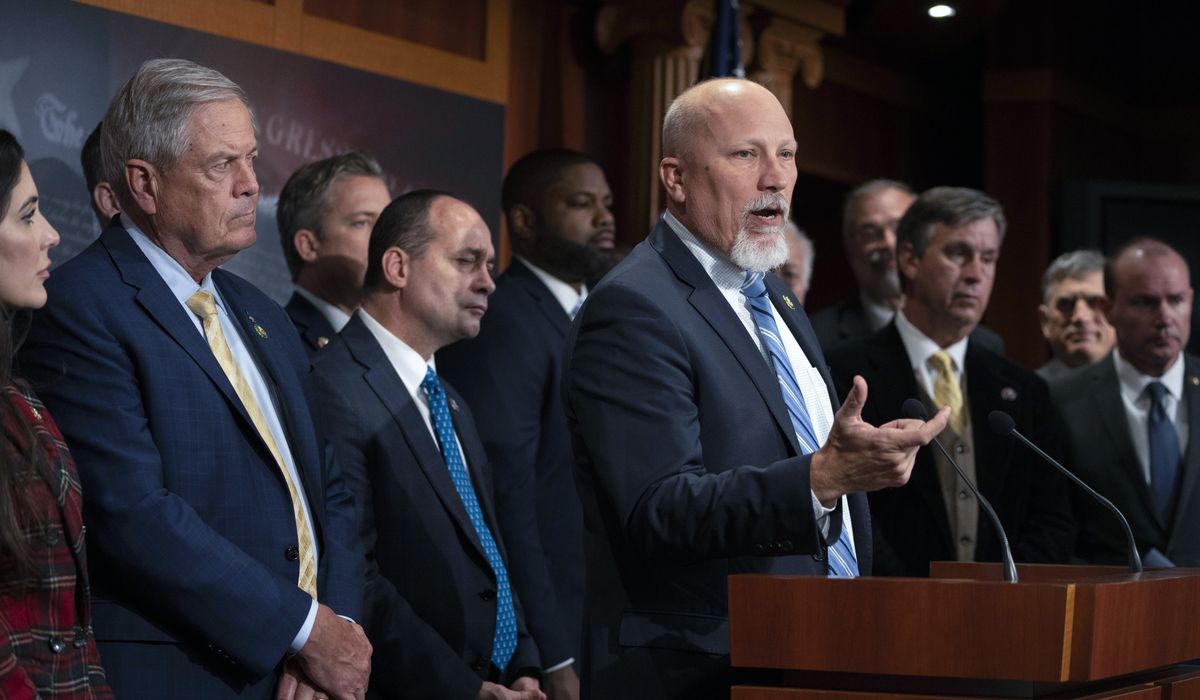


The House Freedom Caucus on Thursday unveiled the first step in a two-part plan to pass President-elect Donald Trump’s program as Republicans aim to unite behind a strategy.
Their proposal for the budget reconciliation process offers a plan built for two bills, despite many in the House GOP, including House Speaker Mike Johnson, favoring a single, massive bill.
Senate Republicans, like the Freedom Caucus, favor a two-track approach because it would let Congress move key components of Mr. Trump’s agenda much faster. It’s also the same plan that Rep. Chip Roy, Texas Republican, said his GOP colleagues had already rejected.
The hardline caucus pitched its vision for the reconciliation process as a way to deliver “huge early wins” that tackle hiking the debt limit, defense and border funding, and immigration and energy policy. It also proposed several offsets for the proposed funding, including work requirements for Medicaid and the Supplemental Nutrition Assistance Program, and rolling back policies from the Biden administration.
One of the key benefits for using the filibuster-proof reconciliation process for the GOP is to avoid negotiating or compromising with Democrats, a point the Freedom Caucus emphasized.
“Our proposal is a Republican plan that we believe can reach 218 votes, that would also allow us to keep the ball on the Republican side of the negotiating field for defense and nondefense appropriations — while delivering wins and uniting the conference,” the lawmakers said in a statement.
Their proposal would immediately address Mr. Trump’s wish to raise the debt limit, a prickly issue for debt hawks.
The Freedom Caucus’ offering would allow for a $4 trillion increase to the statutory borrowing limit — enough to prevent a default crisis for two years — in exchange for “dollar-for-dollar savings over 10 years.” While the debt limit increase would be part of the first reconciliation bill under the Freedom Caucus’ plan, it said the spending cuts could span reconciliation bills and upcoming spending bills.
That effectively means the Freedom Caucus is looking for up to $4 trillion in cuts over a decade, almost double the slashing it sought in the tentative agreement struck in December to quell a rebellion against Mr. Johnson’s attempts to avoid a government shutdown.
It would also greenlight up to $300 billion in spending for defense and border security over four years and to modernize the military to “ensure we beat China.”
The Freedom Caucus said it would agree to the mandatory defense spending increase in reconciliation only if Republicans limit annual discretionary spending while providing a pathway for the Department of Government Efficiency to recommend cuts in the upcoming round of spending bills.
The reconciliation plan would also try to save up to $541 billion over the next decade by reversing a spate of President Biden’s policies, including repealing the administration’s electric vehicle mandate, clawing back funding from the Internal Revenue Service and nuking Mr. Biden’s student loan bailout plan.
The caucus would also try to recoup tens of billions of dollars by imposing fees on parolees, asylum seekers and other migrants released by the Biden administration and make migrants ineligible for welfare.
Mr. Johnson, Louisiana Republican, is walking a tightrope in his effort to get House Republicans to coalesce around a plan. He can’t afford to lose any support on a reconciliation measure, be it one or two bills. Winning over the Freedom Caucus with a plan is crucial to his and the GOP’s promise to pass Mr. Trump’s ambitious agenda, given Republicans’ razor-thin margin in the House.
“We stand ready to consider any proposal, and to work with colleagues on their specific issues and negotiate in good faith on spending cuts necessary to make reconciliation actually result in deficit reduction, be it one bill or two,” the Freedom Caucus lawmakers said. “But we must not waste a single legislative day — and the rapid adoption of an approach such as this would accomplish many of our most important objectives quickly. The American people do not want to wait.”
• Alex Miller can be reached at amiller@washingtontimes.com.
